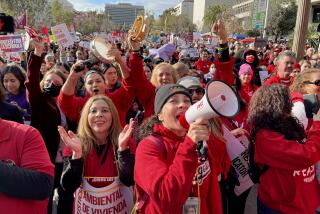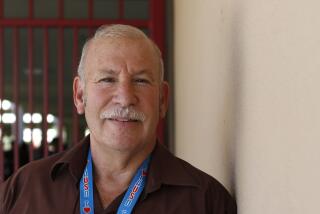Editorial: LAUSD makes a bid for more tax dollars
The six-day teachers’ strike in January brought Los Angeles public schools to the forefront of the civic conversation. Struggling, overburdened teachers; underperforming, underfunded schools; low-income students and students of color seeking a decent education in the face of seemingly insuperable obstacles — suddenly these issues were back on the table after years of neglect.
The strike was bitter and divisive. But it also presented an opportunity for the Los Angeles Unified School District. Here in California, per-pupil spending is half what it is in the best-funded states; at L.A. Unified, almost 70% of the district’s students are not proficient in math and about 60% are not proficient in English.
District leaders quickly realized that it would be foolish to miss this moment in the public eye. That’s why, even though the timing is tight and too few voters will show up, the school board is seriously considering placing a parcel tax on the ballot at a special election in June. It’s a smart if opportunistic move; momentum and support can dissipate with frightening speed.
At the moment, the wording of the proposal calls for the parcel tax to continue in perpetuity with no sunset clause.
As discussed by the board on Tuesday, homeowners and businesses would be charged 12 to 16 cents per square foot of improved property — the exact amount will probably be set at a board meeting Thursday — raising $340 million to $500 million each year. At 16 cents, the owner of an 1,800-square-foot house would pay $288 a year. The tax would come close to closing the district’s structural deficit and providing the smaller class sizes and additional nurses and counselors that were agreed upon in the strike settlement.
A poll commissioned by the district in the wake of the walkout showed that more than 70% of likely voters would be willing to pay a parcel tax of 16 cents, even after they heard arguments against it.
We’re still waiting to see the full and final language of the proposal before taking a position on it; only a summary was released at Tuesday’s board meeting. The details matter — including, especially, what mechanisms will be put in place to ensure the money is spent responsibly and effectively. It is important to remember both that the money needs to be well spent, and that even well-spent money won’t solve all the problems at L.A. Unified.
Still, there is no denying the abysmal shortage of funding for public schools in general and L.A. Unified in particular. California used to be the most generous in the nation at funding its schools; now, just a generation later, it hovers close to the bottom of the rankings, when the funding is adjusted for cost of living. During the years that California has been cutting back its education spending, the needs of its students have grown. There are far more low-income students, foster kids and immigrant children who are not fluent in English. Only three states have bigger student-to-teacher ratios.
L.A.’s schools need to attract more qualified math and science teachers. They need to provide a measure of help with physical and mental health. They need laboratories and computers and access to vocational training. This isn’t the stuff of luxury. These are the basics of a modern public education.
Even if the parcel tax passes — and even if further help comes in the form of a statewide ballot measure for schools — per-pupil funding still won’t come close to what New York and New Jersey spend. In fact, the parcel tax won’t cover the burgeoning costs of healthcare and pension benefits for teachers over the coming decades.
The draft language discussed Tuesday includes some important elements. Parcel taxes are regressive by nature, but because this tax would be based on square footage of improved property, rather than charging a flat rate for each parcel, it mitigates that. The elderly and disabled would be exempt.
Enter the Fray: First takes on the news of the minute »
There is a suggestion in the language that the district will establish a citizen oversight committee and hold annual audits to make sure the money is being spent wisely and effectively. That’s important. The oversight committee should be given strong powers, and audits should not be just financial statements but independent qualitative analyses, similar to what the Government Accountability Office performs at the federal level. That’s critical not just for winning public support, but for good governance.
At the moment, the wording of the proposal calls for the parcel tax to continue in perpetuity with no sunset clause. That would be a serious mistake — and outside the norm for a school parcel tax. One study found that 80% of California parcel taxes sunset within five to 10 years. That’s an essential element of oversight. Schools Supt. Austin Beutner said the language of the tax could still be amended to include an endpoint. A sunset provision of 10 years or less should be added so that voters can have a chance to reconsider whether their money is being well spent and whether student achievement and outcomes are at last improving.
Follow the Opinion section on Twitter @latimesopinionand Facebook
More to Read
A cure for the common opinion
Get thought-provoking perspectives with our weekly newsletter.
You may occasionally receive promotional content from the Los Angeles Times.






